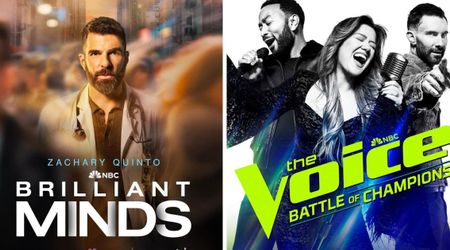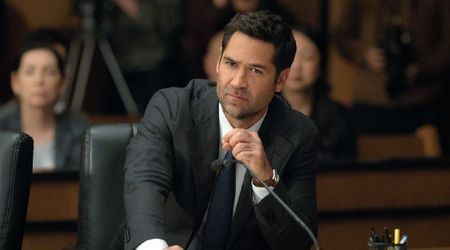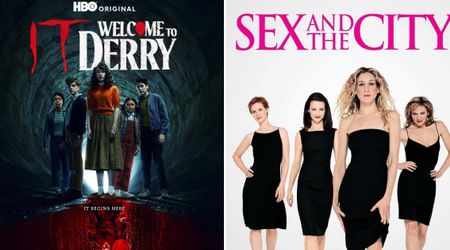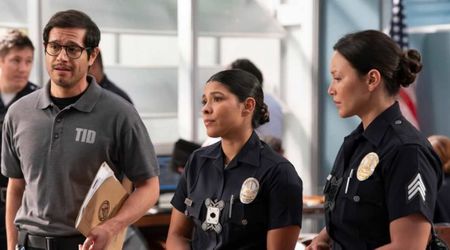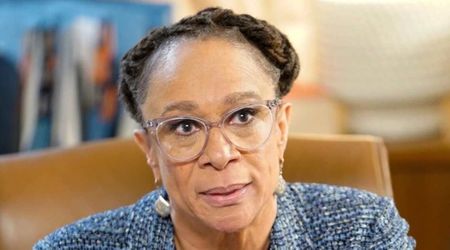'Euphoria' and 'Big Little Lies' fail to address the real impact social media use has on teenage mental health

Despite dreamy washes of pinks, blues and sparkles on Zendaya's face featured on the poster of 'Euphoria', the subtext was clear. As clear as the big old teardrop coursing artfully down her face. The kids were far from alright. The show was to be a "ripped from the headlines" take on the state of the nation's teens, especially their mental health. A reasonable premise considering that the National Institute of Mental Health found that almost a third of American adolescents have experienced an anxiety disorder during their lifetime.
HBO's 'Euphoria' first season weaved its way around the world that this made, framing Gen Z childhoods in the light of adult concerns around such alarming statistics.
In the first of many deadpan voiceovers, Zendaya's character Rue intoned in the first episode: "I was born three days after 9/11… My mother and father spent two days in the hospital, holding me under the soft glow of the television, watching those towers fall over and over again until the feelings of grief gave way to numbness."
Technically, as a new-born infant, she could not have directly experienced the collective trauma felt by those old enough to witness and understand the event. But it becomes clear that the trauma experienced by the adults did invade her childhood – with her parents and doctors reflecting on their own anxiety and depression back onto her, worsening her condition with a variety of (mis)diagnoses and treatment plans (The show was never clear about her malaise though later episodes pointed to her being bi-polar with mostly depressed states and one 'manic' episode, featuring 'Detective Rue').
Overmedicated, she doesn't remember much between the ages of eight and 12 and succumbed to the miasma of dread and anxiety that shrouded her environment for as long as she remembered. She quipped: "Yeah, well, the world is coming to an end, and I haven't even graduated high school yet."
The other HBO prestige drama, 'Big Little Lies', aired just before 'Euphoria' on Sundays during their parallel primetime television run, echoed a similar thought process. Renata's daughter Amabella, collapsed from a panic attack in the schoolroom closet as her classmates yelled "Sustainability!!!" in the third episode. As the child psychiatrist (cosplaying as Bo Peep!) explained to Renata, Amabella was "worried about the end of the planet".

It elicited a storm of Twitter comments from adults who identified with Amabella. The show presented a darkly comedic take on the parent and teacher discussions of what (and how much) to reveal to the children about the big bad world, even as their kids are exposed to incessant news cycles of collective and large-scale trauma (read shootings, bombings, and climate change).
And there lies the catch. Though both shows drew fully on Gen Z experiences, at the end of the day, they were made by and for their parents. Even 'Euphoria', purportedly a teen drama, better reflected what parents today think has gone wrong with Gen Z and their guilt of not having done right by them. Both shows were built around the fluidities that have come to characterize modern-day patchwork family units.
Adults on the show, negotiating and compensating for their issues of trust and stability, were depicted as being unable to cope with Gen Z's fluidities of expressions around gender, sexuality ('Euphoria') or even career ambitions ('Big Little Lies'). It is the kind of experimentation that is not surprising if you take into account their media-fed sociocultural diet since childhood.
According to a study on 'Teens, Social media & Technology' by the Pew Research Centre, 92% of teens were online daily, which includes the 24% who say they are online "almost constantly" through their smartphones. But even though modern gadgetry was evident on the shows as the children and teens used their iPads to watch home movies, surf PornHub and text or sext on their mobile phones, they were little more than empty props or entry points to steer plot points and possibly dinnertime conversation after TV watching about how the kids are on the phone "all the time‟.
However, there was no commentary on how this ubiquitous technology created a hyper-aware generation raised on a steady diet of online media since birth. There was also silence within the shows on the impact of social media and its amplified messaging through repeated shares and views, even of disturbing footage like live feeds of suicides on Facebook Live, or of violence and bullying within their peer group, or mass shootings, bombings, terrorist threats and natural disasters in America and across the world.
According to a study on children in grades three to eight who witnessed "someone being hit, slapped or punched found that 12% of these children reported levels of anxiety that could require treatment", stated an article by Dr Daniel J Flannery of the Begun Centre for Violence Prevention Research and Education. There is more.

In an illuminating talk about Gen Z and social media, 29-year-old YouTuber, stand-up comedian, and filmmaker Bo Burham said: "Social media is just the market's answer to a generation that demanded to perform. So the market said 'Here. Perform everything. To each other, all the time, for no reason'. It's a prison. It's horrific. It is performer and audience melded together. What do we want to do is lie in our bed at the end of the day and watch our lives as a satisfied audience member."
Social media and digital access have fundamentally changed how children and teens shape their identities. As they "perform" their personalities 24/7 to each other, they navigate the resulting performance anxiety and curating involved in this presentation, for the final metric-quantified rejection or acceptance of the end "product‟ — their selfhood.
Given this context of how important online validation is to Gen Z, the Kat storyline on 'Euphoria' makes more sense. But without it, as it is presented on the show, Kat's quick shift from anxiety about her viral sex tape to camming for money seems like a bizarre leap.

Bo Burnham accurately portrayed this need for approval in his debut film 'Eighth Grade', in which 13-year-old Kayla navigates suburban adolescence. In the film, she posts motivational YouTube videos about being confident and assertive even as she is voted 'Most Quiet' by her class and struggles to make friends. But even her "curated" online self fails to elicit views.
So, watching a time capsule of her past self from the sixth grade asking her about her love life and friend circles immediately triggers a profound negative self-evaluation. It prompts her to ask her dad if she makes him sad given how she has turned out. The words "disappointing" or "inadequate" are never expressed but it is heart-breaking to hear Kayla mumble that if she had a daughter like herself, she would love her (because it was obligatory as a parent) but she would be sad with who she was.
For Gen Z, the monster is not "out there" as HBO's programming would have you believe. Seventeen-year-old Billie Ellish, the IT girl of Gen Z, puts it succinctly when she says the monster under the bed "is me" and "I want to end me". It is telling that she thinks that all that is bad and unacceptable in the world is reflected within. Maybe HBO should tune into this next generation of their audience for 'Euphoria' season two.

